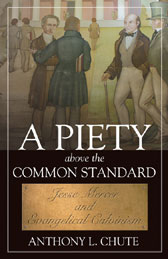

 |
Anthony L. Chute. A Piety Above the Common Standard: Jesse Mercer and the Evangelistic Calvinism. Macon, GA: Mercer University Press, 2004. 238 pages. ISBN 0-86554-875-7. Reviewed by Alan Scot Willis, for the Journal of Southern Religion.
| "A Piety above the Common Standard sheds considerable light on the intellectual history of early nineteenth-century Baptists in the South where conflicts over Calvinism and missions roused heated battles waged with quill pens and scriptural interpretation.." |
A Piety above the Common Standard sheds considerable light on the intellectual history of early nineteenth-century Baptists in the South where conflicts over Calvinism and missions roused heated battles waged with quill pens and scriptural interpretation. Chute thoroughly examines the doctrine-driven war that the Primitive and Missionary Baptists fought over the nature of election, of grace, and of the atonement. Neither side was willing to appease the other, even for the sake of Christian unity; neither side was willing to see their differences as “disagreements among brethren.” Instead, both saw the opposition as abandoning “truth” (20). Indeed, Chute seems to suggest—without quite stating it—that Baptists in nineteenth-century Georgia engaged in a culture war not so very different from the one that rocked the Southern Baptists in the late twentieth century.
The split between the Primitive and Missionary Baptists is central to the author's story, for it is this split, and Jesse Mercer's attempts to prevent it, that provides the framework through which Chute explains Mercer's ideas. The central dividing point was the extent of human responsibility in bringing the “saints” to grace. For the Primitive Baptists, missionary activity suggested that God was incapable of accomplishing His goals by Himself and needed human help—an idea that smacked of questioning the sovereignty of God. For Mercer, missions were a mere means, and a means clearly sanctioned in the Bible. Mercer pointed to the missionaries of the early church, Paul foremost among them, to demonstrate that God had incorporated such means in His predetermined plan of salvation. Their use in no way questioned God's sovereignty; indeed, God had mandated the use of such means because the proclamation of the Gospel was essential to bringing the elect to understand their own depravity and to affording them the opportunity to accept grace (79-80). True, some of the unelected would hear the Word, but without the Spirit working in their souls they could not be saved, regardless of their participation in a revival. Thus Mercer was not concerned that the churches might become overrun with the unregenerate. Mercer engaged in similar arguments regarding the need for an educated ministry and participation in benevolent societies and temperance organizations, all of which are well displayed by Chute.
On the other hand, Chute is not so adept at providing the social context surrounding the debates. With few exceptions, like the brief discussion of Mercer's changing views on temperance, he does contextualize the arguments well. This is a bit surprising since the camp meetings were major social gatherings. Mercer was undoubtedly aware of their excesses, yet Chute does little to create a sense of dialectical interplay between Mercer's theological ideas and his experiences with the revivals themselves. While more attention to the social world might have resulted in a work with broader appeal, it would not likely alter Chute's conclusions.
The author scoured Jesse Mercer's own writings, most especially his writings in The Christian Index. Chute balances Mercer's writings with letters to the Index as well as editorials from The Primitive Baptist. His sources are primarily from published materials, allowing him to examine the intensely theological debates that took place in a public forum. However much Baptists, and especially Primitive Baptists, disparaged intellectuals and the need for an educated ministry, they deftly argued scriptural authority for their positions. Chute clearly shows the seriousness with which they took such ideas. In the process, he makes clear the meaning of nuanced ideas no longer commonly current in a distinctly non-Calvinist America, making the work accessible to readers with no significant background in religion. Yet, the book's appeal seems limited to those primarily interested in religion and intellectual history.
A Piety above the Common Standard makes a substantial contribution to the study of antebellum Southern religion. It provides a detailed examination of the debates that divided Primitive and Missionary Baptists in Georgia though the eyes of one person, Jesse Mercer, who tried to bridge the gap by using Calvinism to defend the evangelical “new methods.” Primitive Baptists, who have stayed closer to their Calvinist roots, constitute a small segment of American Protestantism, while Southern Baptists, who have—in Chute's words—“significantly toned down” their Calvinism, have become the largest Protestant denomination in the world (218). Mercer's views pointed toward the easing of Calvinism in the interest of growth, even if, as Chute claims, he did not himself go that direction.
Alan Scot Willis, Northern Michigan University
© 1998-2005 by The Journal of Southern Religion. All rights reserved. ISSN 1094-5253